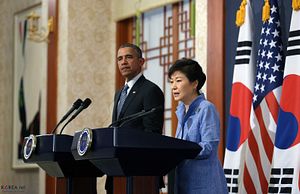The Rebalance authors Mercy Kuo and Angie Tang regularly engage subject-matter experts, policy practitioners and strategic thinkers across the globe for their diverse insights into the U.S. rebalance to Asia. This conversation with Soo Kim – 2015 National Security Fellow at the Foundation for Defense of Democracies and former intelligence officer at the Central Intelligence Agency, specializing in nuclear proliferation, propaganda analysis, leadership studies, political psychology, and authoritarian regimes – is the 38th in “The Rebalance Insight Series”.
What were the main objectives achieved at the recent meeting between South Korea’s President Park Geun-hye and U.S. President Barack Obama in Washington DC?
Presidents Park and Obama aimed to underscore the exigency of finding a collective strategy to deter and defend against North Korea’s aggression and pressure the Kim regime to give up its nuclear weapons. The recent spate of nuclear and missile provocations from the DPRK has magnified and exacerbated a perennial security dilemma for the U.S. and Northeast Asia. The Obama-Park meeting continues the momentum for the global community to thoroughly implement UN sanctions – the linchpin to effectively clamping down on the Kim regime – to restrict Pyongyang’s access to financial channels feeding into its nuclear program. The U.S. security commitment guarantee on the peninsula and calls for stringent enforcement of UNSCR [UN Security Council Resolution] 2270 confirm Washington’s strong backing of Seoul’s efforts to deter Pyongyang’s bad behavior and form the basis for the international community’s concerted strategy to discourage the DPRK’s nuclear pursuits.
What has been the impact of UN sanctions on North Korea?
UNSCR 2270 is the international community’s two-pronged response to the recent spate of North Korean provocations – Pyongyang’s January 6 hydrogen bomb test and February 7 satellite launch. On the one hand, the resolution aims to politically and symbolically castigate the Kim regime for challenging the stability of Northeast Asia. On the other hand, it has the intended goal of applying economic pressure on North Korea – using financial sanctions and restrictions to strangle the various illicit tributary income sources sustaining Kim’s regime and funding its nuclear and missile programs – to convince Pyongyang to return to the negotiating table on denuclearization. The impact of UNSCR 2270 is contingent upon Member States’ (namely, China) willingness to cooperate and actually implement the sanctions. If Beijing’s calculus proves that the economic and political benefits of a nuclear-armed North Korea far outweigh the costs incurred in the region – provocation-borne instability or a stalemate in the standoff between a nuclear-armed Pyongyang and the nonproliferation regime – China may not follow through on its recent pledge to support the international community’s efforts to clamp down on the Kim regime.
How would China’s enforcement of sanctions on North Korea affect Beijing’s regional and global influence?
China’s follow-through on UNSCR 2270 – immobilizing North Korea’s currency flows and cutting funding sources for its nuclear and ballistic missile programs – could be a clarion call to the global community about Beijing’s evolved position on the DPRK. In joining the U.S., South Korea, and other like-minded countries in the effort to curb North Korea’s bad behavior, China will be able to shift from its long-held standing as an uncooperative nation whose interests generally conflicted with those of the international community to a key player in maintaining stability in Northeast Asia. Regionally, Beijing’s stabilizing role would ease tensions with Seoul and Tokyo, perhaps even facilitating three-way security and economic cooperation. Globally, China could help bolster trust-building with the United States, thereby enhancing Beijing’s reputation as a reliable and credible guarantor of international security.
What are potential tripwires that might exacerbate escalating tensions between North and South Korea?
Tensions on the Peninsula have already been elevated by the sheer frequency of North Korea’s provocations this year. In just three months, the country managed to test a hydrogen bomb and carry out three missile-related launches. But missile and nuclear tests are not anything that Seoul has not seen before. South Koreans have been inured to Pyongyang’s nuclear and missile threats, which are intimidation tactics in theory, but practically speaking, the threat is not palpable.
What could ignite escalation is a direct North Korean attack on South Korean territory, civilians, or military. Something that disrupts the daily routine and livelihoods of ordinary South Koreans would provide grounds for Seoul to ratchet up its menu of response options. It would be in both Seoul and Pyongyang’s interest, however, to avoid armed conflict. Peninsular tensions can only escalate so far, unless either side is willing to bear the consequential political, economic, and infrastructure risks.
For the next U.S. president, what would be an effective strategy to strengthen security alliances with South Korea and Japan to preserve regional stability?
The Seoul-Tokyo rivalry and perennial disputes between the two countries are sticking points in effective bilateral and U.S.-South Korea-Japan relations. These squabbles are usually just that – small, periodic arguments on historical revisionism and territorial rights that rarely escalate into any destabilizing conflict. It is easy for third-party nations to dismiss these as such, but neighborly tiffs do impact the cohesiveness among like-minded neighbors and trilateral security cooperation with Washington.
An astute U.S. foreign policy in Northeast Asia would seek ways to minimize these small-scale disagreements, prioritizing regional stability over national interests. Washington should also dispel the perception that one country holds preferred status over the other, particularly when dealing with perennial contentious issues between the two countries, as this could weaken the cohesiveness of not just the trilateral, but U.S. bilateral relations with South Korea and Japan, as well. The U.S. should continue to provide credible security guarantees to both countries against potential destabilizing factors, namely North Korea’s belligerence and China’s expanding political and military reach in the region.

































